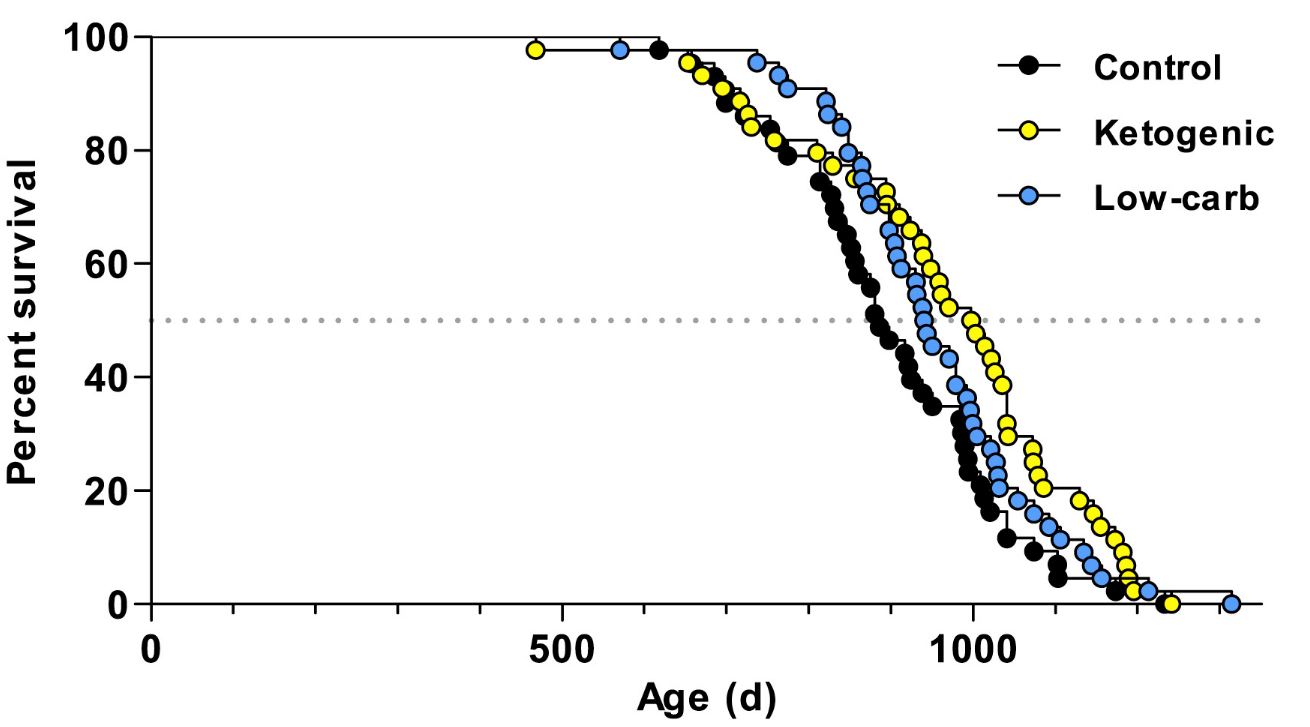关于生酮饮食的一点笔记
文章目录
个人笔记向,几乎全篇复制粘贴,涉及用脑部分少于 10%。
本来要把标题写成“当我们谈论生酮饮食的时候我们在谈论什么”,但是觉得太羞耻了,作罢…
TLDR
TL; DR:低碳水饮食(Low-carbohydrate diet)、生酮饮食(Ketogenic diet, KD)都没有标准化的定义,对于长期控制体重的效果以及长期对身体健康的影响都缺乏高质量研究支持。生酮饮食短期内能迅速降低体重,但是长期来看也许和其他饮食没有明显差别。长期体重控制更多依赖于限制总卡路里摄入和长期坚持而非限制卡路里来源。目前生酮饮食在治疗儿童癫痫方面应用广泛并且研究证据充分,但对于治疗肥胖、代谢综合征(肥胖、糖尿病等)等方面争议很大。另外,生酮饮食短期内对健康的影响有所研究,但对健康的长期影响(包括心血管疾病、胰岛素抵抗、肥胖甚至是死亡率等方面)仍待研究。
(总的来说就是 We know nothing actually)
What is…
低碳水饮食和生酮饮食都缺乏标准定义,常规认为卡路里摄入中碳水来源至少低于 30% 才能算是低碳水饮食,而生酮饮食要求总卡路里摄入中脂质来源至少达到 60% 以上、碳水低于 10~20% (10g 以下)以及蛋白质来源低于 30%(蛋白质代谢上十很容易转化为糖,所以也需要比较严格的限制)。
Wikipedia: Low-carbohydrate diet
…lack of standardization of how much carbohydrate low-carbohydrate diets must have… the American Academy of Family Physicians, specifies low-carbohydrate diets as having less than 20% carbohydrate content. There is no good evidence that low-carbohydrate dieting confers any particular health benefits apart from weight loss. An extreme form of low-carbohydrate diet called the ketogenic diet …became a popular fad diet for weight loss through celebrity endorsement, but there is no evidence of any distinctive benefit for this purpose and the diet carries a risk of adverse effects, with the British Dietetic Association naming it one of the “top five worst celeb diets to avoid” in 2018. There is evidence that the quality, rather than the quantity, of carbohydrate in a diet is important for health In the long-term successful weight maintenance is determined by calorie intake, and not by macronutrient ratios. the rise in obesity prevalence may be primarily due to increased consumption of refined carbohydrates, but the mechanisms are likely to be quite different from those proposed by the carbohydrate–insulin model. It has been repeatedly found that in the long-term, all diets with the same calorific value perform the same for weight loss, except for the one differentiating factor of how well people can faithfully follow the dietary programme.
Journal articles
Bueno, N., De Melo, I., De Oliveira, S., & Da Rocha Ataide, T. (2013). Very-low-carbohydrate ketogenic diet v. low-fat diet for long-term weight loss: A meta-analysis of randomised controlled trials. British Journal of Nutrition, 110(7), 1178-1187. doi: 10.1017/S0007114513000548 Q2/3.3340
Meta 分析,纳入 13 项 RCT,肥胖,总纳入研究对象 1500+,随访时间超过 1 年,比较极低碳水饮食和低脂饮食
13 RCTs, N = 1577 (787 from LFD group + 790 VLCKD group), adult, BMI > 27.5, follow-up > 12mo

Individuals assigned to a VLCKD achieve a greater weight loss than those assigned to a LFD in the long term; hence, a VLCKD may be an alternative tool against obesity.
Paoli, A. (2014). Ketogenic diet for obesity: friend or foe?. International journal of environmental research and public health, 11(2), 2092-2107. doi: 10.3390/ijerph110202092 Q1/2 2.8488
可能机制
There is no doubt that there is strong supportive evidence that the use of ketogenic diets in weight loss therapy is effective, however the mechanisms underlying the effects of KDs on weight loss is still a subject of debate. Hence we can summarize (listed in order of available evidence) the hypothesized mechanisms of KD’s weight loss effects: 1. Reduction in appetite due to higher satiety effect of proteins, effects on appetite control hormones and to a possible direct appetite suppressant action of the ketone bodies; 2. Reduction in lipogenesis and increased lipolysis; 3. Greater metabolic efficiency in consuming fats highlighted by the reduction in the resting respiratory quotient]; 4. Increased metabolic costs of gluconeogenesis and the thermic effect of proteins.
Hence the beneficial effects of very low carbohydrate diets in obese subjects are not just a function of weight loss per se but also improved glycaemic control, haemoglobin A1c, and lipid markers, as well as reduced use or withdrawal of insulin and other medications in many cases, occurs before significant weight loss occurs.
Paoli, A., Bosco, G., Camporesi, E. M., & Mangar, D. (2015). Ketosis, ketogenic diet and food intake control: a complex relationship. Frontiers in psychology, 6, 27. doi: 10.3389/fpsyg.2015.00027 Q3/2.0668
综述。酮体和生酮饮食,代谢,和食物摄入、食欲的关系 降低食欲,减少食物摄入,但是机制仍有待研究。
Although the hunger-reducing effect of KD is well-documented, its main mechanisms of action are still elusive. Ketones (mainly BHB) can act both orexigenically or anorexigenically. It can be postulated that the net balance of the contrasting stimuli results in a general reduction of perceived hunger and food intake. More studies are needed to explore the mechanism of potential beneficial effects of KD on food control.
Hall, K. D., Chen, K. Y., Guo, J., Lam, Y. Y., Leibel, R. L., Mayer, L. E., … & Ravussin, E. (2016). Energy expenditure and body composition changes after an isocaloric ketogenic diet in overweight and obese men. The American journal of clinical nutrition, 104(2), 324-333. doi: 10.3945/ajcn.116.133561 Q1/6.766
初步研究结果显示 KD 没有引起更多的体脂减少,但稍增加代谢
17 overweight and obese men: Z
 The isocaloric KD was not accompanied by increased body fat loss but was associated with relatively small increases in EE that were near the limits of detection with the use of state-of-the-art technology.
The isocaloric KD was not accompanied by increased body fat loss but was associated with relatively small increases in EE that were near the limits of detection with the use of state-of-the-art technology.Newman, J. C., Covarrubias, A. J., Zhao, M., Yu, X., Gut, P., Ng, C. P., … & Verdin, E. (2017). Ketogenic diet reduces midlife mortality and improves memory in aging mice. Cell metabolism, 26(3), 547-557. doi: 10.1016/j.cmet.2017.08.004 Q1/21.5662
KD 延长了年老小鼠的生存,改善记忆
VERY INTERESTING


Roberts, M. N., Wallace, M. A., Tomilov, A. A., Zhou, Z., Marcotte, G. R., Tran, D., … & Lopez-Dominguez, J. A. (2017). A ketogenic diet extends longevity and healthspan in adult mice. Cell metabolism, 26(3), 539-546. doi: 10.1016/j.cmet.2017.08.005 Q1/21.5662
KD 延长了成年小鼠生存
VERY INTERESTING
Highlights: - A low-carbohydrate, ketogenic diet extends longevity in adult male mice - Motor function, memory, and muscle mass are preserved in aged ketogenic mice - Protein acetylation is increased in the liver and skeletal muscle of ketogenic mice
 Survival:
Survival:

Stenger, E., Schaeffer, M., Cances, C., Motte, J., Auvin, S., Ville, D., Maurey, H., Nabbout, R., & de Saint-Martin, A. (2017). Efficacy of a ketogenic diet in resistant myoclono-astatic epilepsy: A French multicenter retrospective study. Epilepsy research, 131, 64–69. 10.1016/j.eplepsyres.2017.02.005
癫痫
Early introduction of KD treatment in resistant MAE has a strong, persistent anticonvulsant effect with long-term remission and better cognitive outcomes.
Ludwig, D. S., Willett, W. C., Volek, J. S., & Neuhouser, M. L. (2018). Dietary fat: from foe to friend?. Science, 362(6416), 764-770. doi: 10.1126/science.aau2096
Science 综述。碳水和脂质摄入与肥胖的关系这一问题的历史来源,现状。
VERY INTERESTING AND COMPREHENSIVE. MUST READ ✔
…the U.S. Senate Select Committee on Nutrition and Human Needs in 1977 called on Americans to reduce consumption of total and saturated fat, increase carbohydrate intake, and lower calorie intake… with little scientific training…the recommendations were hotly debated. The Surgeon General’s Report on Nutrition and Health in 1988 identified reduction of fat consumption as the “primary dietary priority,”…The 1992 Food Guide Pyramid of the U.S. Department of Agriculture advised eating 6 to 11 daily servings of starchy foods … while limiting all fats and oils. To facilitate this goal, the U.S. Healthy People 2000 report of the Department of Health and Human Services called on the food industry to market thousands of new “processed food products that are reduced in fat and saturated fat”…driven by a prevailing belief that carbohydrates—all carbohydrates, including highly processed grains and sugar—were innocuous and possibly protective against weight gain, cancer, and cardiovascular disease through multiple mechanisms. As a result, the proportion of fat in the U.S. diet decreased from about 42% in the 1970s to about 34% of total calories today (somewhat greater than the stated goal of <30%) and the proportion of dietary carbohydrates increased substantially. During this time, rates of obesity and diabetes increased greatly, contributing to the first nationwide decrease in life expectancy since the flu pandemic 100 years ago. These trends could be causally connected or unrelated. Despite a lack of clear evidence specifically relating fat consumption (as a proportion of total energy intake) to the epidemics of diet-related disease—and a lack of high-quality, long-term trials focused on macronutrients in general—the pendulum has recently swung in the opposite direction, with rising consumer popularity of low-carbohydrate, high-fat diets. When individuals move from countries with low chronic disease rates to Westernized countries, their incidence of chronic diseases approaches that of their new country within one to two generations. This rapid shift in chronic disease rates spurred thinking that environmental exposures, such as adoption of a higher-fat Western diet, may be causally related to disease risk patterns. Of 29 diets with varying macronutrient composition tested in mice, only high-fat diets, but not high-carbohydrate diets, led to overconsumption and weight gain. …these multiple physiologic mechanisms suggest that higher dietary fat may be harmful for health. However, it is critically important to consider carbohydrate quality when fat intake is lowered.
Kephart WC, Pledge CD, Roberson PA, Mumford PW, Romero MA, Mobley CB, Martin JS, Young KC, Lowery RP, Wilson JM, Huggins KW, Roberts MD. The Three-Month Effects of a Ketogenic Diet on Body Composition, Blood Parameters, and Performance Metrics in CrossFit Trainees: A Pilot Study. Sports. 2018; 6(1):1. doi: 10.3390/sports6010001
KD 和运动表现、体脂
…preliminary data suggest that adopting a ketogenic diet causes marked reductions in whole-body adiposity while not impacting performance measures… increased LDL-C in these individuals warrants further investigation.
Joshi, S., Ostfeld, R. J., & McMacken, M. (2019). The ketogenic diet for obesity and diabetes—enthusiasm outpaces evidence. JAMA internal medicine, 179(9), 1163-1164. doi: 10.1001/jamainternmed.2019.2633
JAMA 旗下子刊的一篇 Viewpoint,作者对 KD 持保留态度,但是下面的 comments 区却异常热闹,很多人认为作者的观点有失偏颇,对一些与其观点相悖的研究证据视而不见。
MUST READ ✔
In a meta-analysis of 13 studies lasting longer than a year, researchers found that the ketogenic diet was associated with less than a kilogram of additional weight loss over high-carbohydrate,low-fat strategies. This difference, although statistically significant, may not be clinically significant. * Furthermore,a meta-analysis of 32 controlled feeding studies found that energy expenditure and fat loss were greater with low-fat diets compared with ketogenic diets. Any diet that results in weight loss does so because it reduces calorie intake.The ketogenic diet, when used for weight loss,is no different. The salient questions are whether it is sustainable and whether it promotes long-term health. No studies, to our knowledge, have evaluated ketogenic diets for cardiovascular events or mortality, although observational studies in the broader low-carbohydrate diet literature suggest increased all-cause mortality. Although the ketogenic diet has garnered much attention for the dietary treatment of chronic diseases such as obesity and type 2 diabetes, the evidence supporting its use is currently limited and the diet’s potential risks are real. Physicians and patients should continue to judiciously appraise the benefits and risks of the ketogenic diet in accordance with the evidence, not the hype. Discussion in 12 comments followed (⬆5 ⬇2 for KD): 1. July 16, 2019. Diabetes and Metabolic Syndrome can be reversed on Keto | Stephen Riggs, MD | MercyOne Waterloo, IA ⬆ 2. July 17, 2019. Ketogenic Diet for Obesity and Diabetes | David Martin, MD, FACG | Pinehurst Medical Clinic ⬆ 3. July 18, 2019. Agree with the authors and not with the comments given | Karen Freijer, PhD | Nutrition and Nutrition Economics ⬇ 4. July 19, 2019. Authors are misguided | Jay Wortman, BSc MD CCFP | University of British Columbia ⬆ 5. July 19, 2019. | Please Represent the Full Picture of the Research | Kelly Sylvester, PhD | University NA 6. July 19, 2019. | The Ketogenic Diet for Obesity and Diabetes—Evidence Outpaces Enthusiasm | Angela Stanton, PhD | self employed ⬆ 7. July 21, 2019. | It’s all about the context, and the alternatives | Omer Berner | Ben Gurion University NA 8. July 28, 2019. | I too disagree | Adeline Louie, MD | retired ⬆ 9. July 29, 2019. | Toxicity of Lipophilic Chemicals | Harold Zeliger, Ph.D. | Zeliger Research & Consulting ⬇ 10. August 3, 2019. | Still Controversial…after all these years | Alexander Anderson, Various | M.D. AndTrade Ltd NA 11. August 3, 2019 | Refreshing Commentary | John Kaplan, MD | Dr. John’s Nutrition Health NA 12. September 9, 2019 | Benefits of true ketogenic diets versus purported ketogenic diets | Irving Cohen, MD, MPH | Foundation for Prevention NA
Ma S, Suzuki K. Keto-Adaptation and Endurance Exercise Capacity, Fatigue Recovery, and Exercise-Induced Muscle and Organ Damage Prevention: A Narrative Review. Sports. 2019; 7(2):40. doi: 10.3390/sports7020040
O’Neill, B., & Raggi, P. (2020). The ketogenic diet: Pros and cons. Atherosclerosis, 292, 119-126.
It is important to remember that a strict keto diet includes no more than 10% of the total daily calorie intake in the form of carbohydrates, 20% as proteins and the remaining as fats….Many may find this restriction too limiting and unpalatable, despite the freedom to ingest as much butter and bacon as desired and may deviate from such enforcement with the simple ingestion of one apple a day…
…subjects without diabetes and the metabolic syndrome should think carefully whether this lifestyle is advisable for any protracted period of time. In contrast, plant-based diets allowing a daily moderate content of non-saturated fats, and small amounts of red meats and saturated fats hold for now the best epidemiological and randomized clinical trial evidence that they are safe and associated with reduction in several chronic diseases, including atherosclerotic cardiovascular disease.
Comments on “The ketogenic diet: Pros and cons”
1
|
>Weight loss is an important outcome but it is not necessarily associated with a lower MACE (Major Adverse Cardiac Events). |
Misc
-
The resurgence of the ketogenic diet as a rapid weight loss formula is a relatively new concept the has shown to be quite effective, at least in the short run.
Two metabolic processes come into action when there is low carbohydrate availability in body tissues: gluconeogenesis and ketogenesis. When glucose availability drops further, the endogenous production of glucose is not able to keep up with the needs of the body and ketogenesis begins in order to provide an alternate source of energy in the form of ketone bodies…This metabolic state is referred to as “nutritional ketosis.” As long as the body is deprived of carbohydrates, metabolism remains in the ketotic state. The nutritional ketosis state is considered quite safe, as ketone bodies are produced in small concentrations without any alterations in blood pH.
The short-term effects (up to 2 years) of the ketogenic diet are well reported and established. However, the long-term health implications are not well known due to limited literature.[6][7][8]
The most common and relatively minor short-term side effects of ketogenic diet include a collection of symptoms like nausea, vomiting, headache, fatigue, dizziness, insomnia, difficulty in exercise tolerance, and constipation, sometimes referred to as keto flu. These symptoms resolve in a few days to few weeks. Ensuring adequate fluid and electrolyte intake can help counter some of these symptoms. Long-term adverse effects include hepatic steatosis, hypoproteinemia, kidney stones, and vitamin and mineral deficiencies.
Due to ketonemia, acetone in the body can sometimes be reduced to isopropanol by hepatic alcohol dehydrogenase which can give a false positive alcohol breath test result.
A well-formulated ketogenic diet, besides limiting carbohydrates, also limits protein intake moderately to less than 1g/lb body weight…it does not restrict fat or overall daily calories. People on a ketogenic diet initially experience rapid weight loss up to 10 lbs in 2 weeks or less. This diet has a diuretic effect, and some early weight loss is due to water weight loss followed by a fat loss. Interestingly with this diet plan, lean body muscle is largely spared. As a nutritional ketosis state sustains, hunger pangs subside, and an overall reduction in caloric intake helps to further weight loss.
Even though the ketogenic diet is significantly superior in the induction of weight loss in otherwise healthy patients with obesity and the induced weight loss is rapid, intense, and sustained until at least 2 year, the understanding of the clinical impacts, safety, tolerability, efficacy, duration of treatment, and prognosis after discontinuation of the diet is challenging and requires further studies to understand the disease-specific mechanisms.
…ketogenic diet may be followed for a minimum of 2 to 3 weeks up to 6 to 12 months. Close monitoring of renal functions while on a ketogenic diet is imperative, and the transition from a ketogenic diet to a standard diet should be gradual and well controlled. …type 2 diabetes mellitus or cardiovascular disease may seem premature but is, however, not farfetched for primary weight loss.
While in the short term the ketogenic diet may help one lose weight, this is not sustained over the long run. In addition, countless studies show that the diet is associated with many complications that often lead to emergency room visits and admissions for dehydration, electrolyte disturbances, and hypoglycemia. [9][10][11]
Mayo Clinic: The truth behind the most popular diet trends of the moment
While the ketogenic diet may be recommended for some people with uncontrolled epilepsy, the high fat content — and especially the high level of unhealthy saturated fat — combined with limits on nutrient-rich fruits, veggies and grains is a concern for long-term heart health.